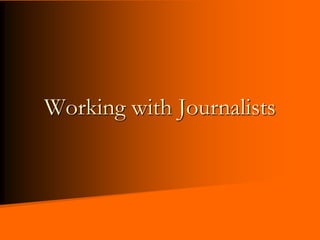
WorkingWithJournalistsEffectively
- 2. Working w/Journalists Survey: media relations #1 responsibility of PR staff Journalists admit using news releases (50-60% of the time) Journalists = info processors, not info gatherers Journalists are 3rd party endorsers PR people save journalists time, money, effort of gathering their own news Publicists operate as “unpaid reporters”
- 3. Working w/Journalists Cont’ Media depends on PR and vice versa 2/3 of journalists say they don’t trust PR people, but 81% say they need them There are areas of friction – Hype/Other Irritations – Name Calling – Sloppy/Biased Reporting – Tabloid Journalism – Advertising Influence
- 4. Hype/Other Irritations Use of over used words: “unique” “revolutionary” Using gimmicks to sell a story – Make sure there is a news hook and clear connection between item and news you are announcing – Send items reporters can use – Consider creative packaging instead of promotional item – Think simply (one item)
- 5. Sloppy/Biased Reporting Execs think news coverage often reflects a reporter’s bias Execs believe journalists don’t do their homework and have no background in the subject they are covering
- 6. Sloppy Cont’ Execs also don’t understand how the media operate and what they need; therefore, they may give vague answers or stonewall – Reduce by: Educating execs on how media operate, basic news values Train execs to give brief answers (soundbites) Provide extensive background information to reporters
- 7. Tabloid Journalism Becoming more prevalent Things to consider when dealing w/sensationalist media: – Never do adversarial interview alone. Have media- savvy attorney sit in on the interview – Research reporter and know his/her method of questioning – Don’t accept any document on camera – Get a commitment that you will be able to respond to accusations made by others
- 8. Advertising Influence Most media dependent on ad revenues Influencing news content – Some newspapers, magazines run stories that prominently feature their advertisers – Big advertisers may demand advance warnings about controversial articles, so it can decide whether to pull its ad Ex., many airlines demand The New York Times yank their ads if they appear near news of an air crash
- 9. Individual Interviews Interview the reporter first Anticipate questions Know your audience Develop a message Answer questions, but link them to your message whenever possible Conclusions first, back up with facts NEVER answer hypothetical questions Always answer positively; it’s the answer that counts, not the question
- 10. News Conferences Reporters ask questions simultaneously Significant news to announce – Crises – # of requests from reporters – New, MAJOR product introduced Consider – Time – Location – Invitations – Organized – Conclusion
- 11. Media Tours Personal visits to multiple cities and media outlets Objective is to: – Generate coverage (schedule interviews w/print and broadcast) – Establish a working relationship (visit w/reporters to educate them about a product or organization, etc.)
- 12. Previews and Parties Used for: – Opening of a new facility – Launch of a new product – Announcement of a new promotion for an already established product – Often held in the evening
- 13. Press Junkets Trips of reporters paid for by company so the reporter can view a new clothing line, product, etc. Used a lot in the travel industry Also used in movie, fashion industries Some debate about whether this is ethical or not
- 14. Editorial Board Meetings Meet with board members of the newspaper to educate them on a cause/issue, position of your organization, etc. Visit to request coverage and editorials supporting a particular cause Used by non-profits, associations, political candidates, trade groups, etc.
- 15. A Media Relations Checklist Know your media Limit your mailings Localize Send newsworthy information Avoid gimmicks Be environmentally friendly Be available/accessible Get back to reporters Answer your own phone
- 16. Checklist Cont’ Be truthful Avoid “off-the-cuff” remarks Protect exclusives Be fair Help the photo/video journalists Explain Remember deadlines Praise good work Correct errors POLITELY
- 17. Advertising Influence Cont’ A Question of Ethics – How does PR person sort out the media that are “for sale” and those that maintain high standards? – Should you build ad costs into your PR budget? – If publication insists you buy an ad to get news coverage, should you? – Is buying an ad in exchange for news coverage or paying an editor a consulting fee a violation of ethics or just good business?
